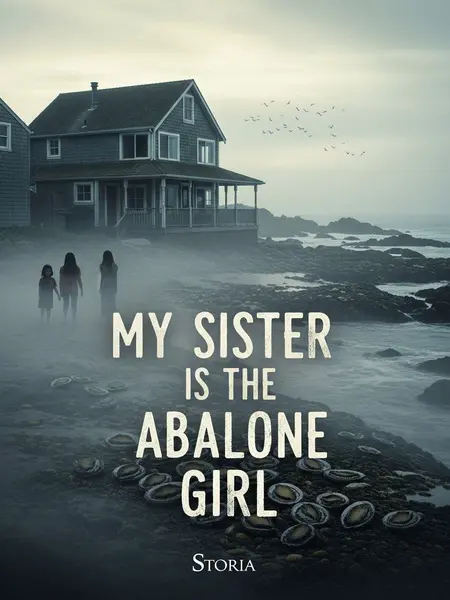Chapter 3: The Rules of the Shack
I tried several times to talk them out of it, but the seafood shack still opened. Even after I put together spreadsheets and budget estimates showing how much it would cost, Dad wouldn’t hear it. He only grunted and told me to “focus on my studies” and “let the grown-ups worry about making a living.”
What I didn’t expect was that the restaurant I doubted actually opened—and not only did it not close down quickly, it became more and more popular, with crowds lining up at the door. It was like something out of a Hallmark movie. The old laundromat was transformed overnight—red-and-white awning, handwritten chalkboard menu, the faint smell of sea salt in the air. On opening day, a line snaked around the block, locals mingling with students, everyone craning their necks for a glimpse.
My dad, who had never even seen the ocean, somehow looked right at home preparing seafood. He wore a white apron like he’d been doing it for decades, barking out orders and wielding a chef’s knife with surprising skill. I even caught him tossing shrimp shells like he was auditioning for a cooking show. Abby and Mom worked quietly behind the scenes, faces serious but determined.
Especially the restaurant’s signature dish: steamed abalone. It became a local sensation. There were food bloggers snapping photos, and someone from The Blade wrote an article calling it “the best-kept secret in Ohio cuisine.” Dad would just grin, serving up his abalone with a wink. The air was always thick with steam and laughter.
The flavor was so extraordinary that customers from as far as Chicago would willingly drive over ten hours just for a taste. Word spread through foodie forums and Instagram reels. Once, I met a couple from Milwaukee who’d planned their anniversary road trip around Dad’s shack. They took selfies outside and posted a TikTok that got thousands of likes overnight.
But Dad’s abalone wasn’t something you could get anytime. First, it was only served to men—women weren’t allowed to eat it at all. Second, it wasn’t available every day; only on the first and fifteenth of each month, and even then, only in limited quantities. The rules became legend. “No abalone for women,” Dad would bark, half-joking, half-serious. Guys would slap each other on the back, cracking jokes about “the manliest meal in town.” Some women tried to argue, but Dad just shrugged. On the first and fifteenth, the place buzzed with anticipation—there was even a group chat just for abalone-day regulars.
When I figured out Dad’s abalone supply rules, I was surprised: “Dad, you may not have much schooling, but you’re great at this scarcity marketing thing. Limited-time, limited-quantity abalone really makes people want it more.” I tried to lighten the mood, half-teasing him in front of Abby and Mom. I’d taken a marketing class and thought I knew all the tricks, but Dad only rolled his eyes.
Dad shot my sister a fierce glare. “I don’t know anything about marketing. It’s just that your sister isn’t capable—she can only produce so much.” His words hung in the air, heavy and strange. Abby shrank back, fiddling with her phone. I caught a flicker of guilt in Mom’s eyes, like she wished Dad had kept his mouth shut.
I looked at my sister, confused. Her face was red with embarrassment, one hand pressed gently to her lower abdomen, and she pleaded, “Dad, I really can’t take it if it’s too much. Can’t we sell a little less?” Her eyes darted to the floor, voice trembling like she was afraid to look me in the eye. For a second, she looked like a little kid caught sneaking cookies. I wanted to reach out, but didn’t know what to say. It was the first time I’d seen her like this—vulnerable, almost scared.
I stared at my sister in confusion. Ever since we moved to town, she’d been acting strangely. She’d always been the responsible one, the steady hand during family crises. Now, though, she was distant, her smiles forced. Sometimes she’d slip away for hours, coming back smelling faintly of the ocean.
Not only was she often absent-minded, but her body sometimes gave off a fishy scent. I tried not to mention it, but even Mom kept extra candles burning in Abby’s room. Once, I found a bottle of Febreze hidden behind her dresser.
“There’s no room for discussion. If you produce less, how much money will I lose? I raised you with so much effort—don’t be ungrateful and forget to pay it back.” Dad’s voice went sharp, the way it did when he talked about making ends meet during the farm crisis. Abby ducked her head, shoulders hunched like she was bracing for a storm.
Seeing Dad’s firm attitude, my sister didn’t dare argue. She covered her face and ran out, crying. Her sobs echoed down the hallway, muffled only by the sound of pots clanging in the kitchen. I wanted to follow her, but Dad shook his head, warning me off.
“Dad, what’s really going on?” My hands trembled as I set down a tray. I tried to meet Dad’s eyes, but he just stared at the floor, lips pressed tight.
“You’ll understand when you get married.” Dad’s eyes flickered, refusing to meet my gaze. His words sounded ancient, almost superstitious. The phrase sent a shiver down my spine. Marriage had always felt far off, something other people worried about.
But clearly, my sister isn’t married either—so how does she know? That thought gnawed at me all evening, echoing as I scrubbed dishes and watched Abby’s bedroom door stay tightly closed. The logic didn’t add up, and I couldn’t shake the sense that something much stranger was happening.
Seeing his reaction, my curiosity only grew. I became obsessed—catching snatches of whispered arguments, watching for clues in every movement. It was like living inside a mystery novel, with me as the unwitting detective.
To get to the bottom of it, I volunteered to help out at the shop, since I had few classes left in my senior year. I told my parents I wanted to “learn the family business,” hoping to get closer to the truth. They looked at each other, exchanged a silent agreement, then nodded.
My parents readily agreed—business was booming, and just the three of them were run ragged. They let out sighs of relief, Mom wiping her brow with a dish towel. Even Abby managed a weak smile, though her eyes darted away from mine.
They also refused to hire any help, so only the three of them worked, busy from dawn till night. Dad said, “Family business is family business. Outsiders just get in the way.” I didn’t push, but I noticed how Abby’s face tightened whenever he said it. We ran ourselves ragged, collapsing onto the worn-out couch every night.
But my sister’s panting and the scene I’d glimpsed in the bedroom kept replaying in my mind. I couldn’t shake the feeling I’d stumbled onto something nobody in our family was supposed to see.













